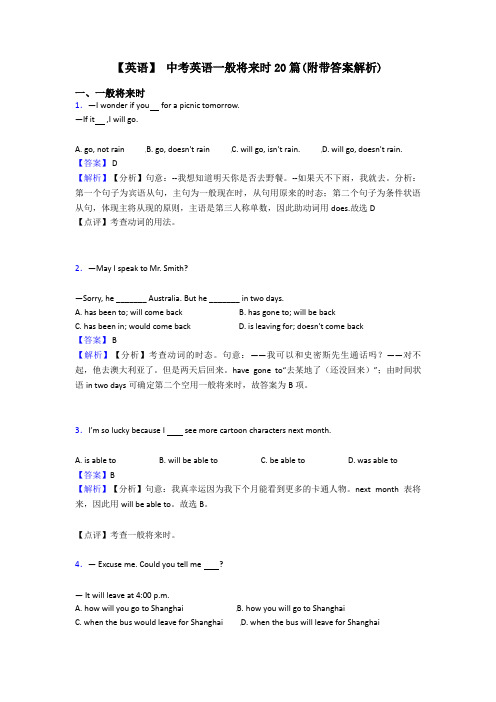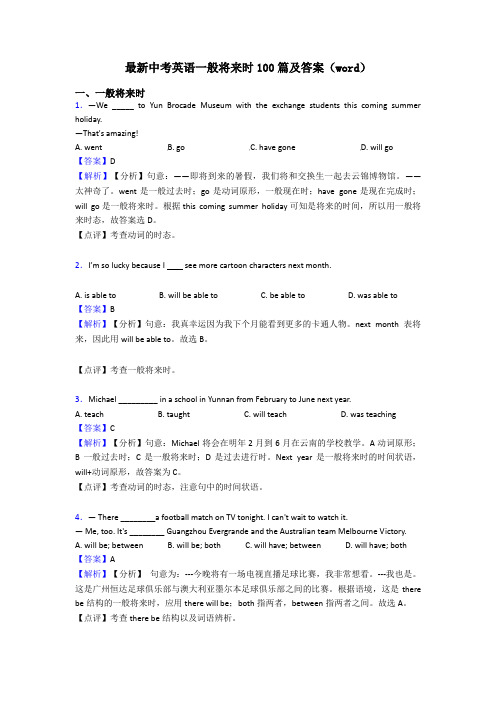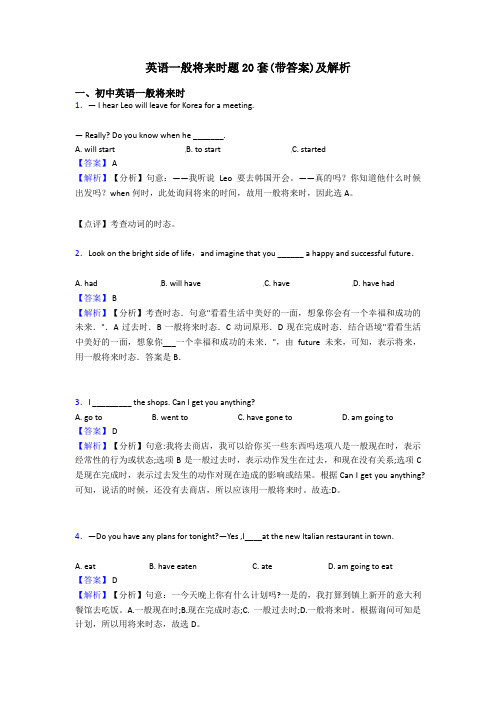中考英语总复习真题一般将来时
专题13-时态四(一般将来时)-备战2023年中考英语一轮复习语法专项练(通用版)(解析版)

专题13-时态四(一般将来时)备战2023年中考英语一轮复习语法专项练(通用版)一、单项选择1.Don’t lose heart. If you keep working hard, you _________ some day.A.will succeed B.succeed C.succeeded D.have succeeded【答案】A【详解】句意:不要灰心。
如果你继续努力,将来某一天你会成功的。
考查if引导的条件状语从句。
if表示“如果”时遵循“主将从现”原则,即主句用一般将来时,从句用一般现在时;空格处于主句位置,故用一般将来时。
故选A。
2.—There ________ a talk by Zhong Nanshan in our school tomorrow afternoon.—Great! We can’t wait!A.is B.was C.will be D.will have【答案】C【详解】句意:——明天下午我们学校将有一场钟南山的演讲。
——太棒了!我们等不及了!考查There be句型和时态。
根据“There …a talk by Zhong Nanshan in our school tomorrow afternoon.”可知,本句为一般将来时,且为There be句型,使用There will be“将有”,故选C。
3.If you talk with your parents more often, you ________ each other better.A.understand B.will understandC.understood D.have understood【答案】B【详解】句意:如果你和你的父母多交谈,你们会更好地了解彼此。
考查动词时态。
根据“If you talk with your parents more often”如果你和你的父母多交谈,可知本句为If引导的条件状语从句,采用“主将从现”的原则,主句用一般将来时,故选B。
【英语】 中考英语一般将来时20篇(附带答案解析)

【英语】中考英语一般将来时20篇(附带答案解析)一、一般将来时1.—I wonder if you for a picnic tomorrow.—If it ,I will go.A. go, not rainB. go, doesn't rainC. will go, isn't rain.D. will go, doesn't rain.【答案】 D【解析】【分析】句意:--我想知道明天你是否去野餐。
--如果天不下雨,我就去。
分析:第一个句子为宾语从句,主句为一般现在时,从句用原来的时态;第二个句子为条件状语从句,体现主将从现的原则,主语是第三人称单数,因此助动词用does.故选D【点评】考查动词的用法。
2.—May I speak to Mr. Smith?—Sorry, he _______ Australia. But he _______ in two days.A. has been to; will come backB. has gone to; will be backC. has been in; would come backD. is leaving for; doesn't come back【答案】 B【解析】【分析】考查动词的时态。
句意:——我可以和史密斯先生通话吗?——对不起,他去澳大利亚了。
但是两天后回来。
have gone to“去某地了(还没回来)”;由时间状语in two days可确定第二个空用一般将来时,故答案为B项。
3.I’m so lucky because I see more cartoon characters next month.A. is able toB. will be able toC. be able toD. was able to【答案】B【解析】【分析】句意:我真幸运因为我下个月能看到更多的卡通人物。
【整理】中考英语一般将来时专项练习(附答案)50题

初中英语:一般将来时专项练习题1.--There aren’t any libraries in our town, are there ? --No, but it is said one _____ next year.A.will be built B.is built C.will build【答案】A【解析】【详解】解析:句意:——我们镇上没有图书馆,是吗?——是的,但是据说明年将会修建一个。
由句中时间状语next year可知是一般将来时,且library与build之间是被动关系。
故答案选A。
点睛:通过观察句子结构可知it is said one_____next year为含有主语从句的复合句,其中主句 it is said 是一般现在时,从句可以用所需要的时态,根据时间状语next year表示一个将来的时间,故从句的时态为一般将来时,再根据从句的主语为one代指上文中的library是谓语动词build的承受者,二者形成被动关系,故用被动语态,所以谓语动词为一般将来时的被动语态,其结构为will+be+及物动词的过去分词,build的过去分词为built。
故答案选A。
2. ---What can I do for you?---I’m looking for the new CD by Li Jian.---Good taste,and only a few left.I believe the CDs you ask for out soon.A.being sold B.is soldC.will be sold D.was selling【答案】C【解析】【详解】试题分析:句意:――我能为你做什么吗?――我正在寻找李建的新唱片。
――好品味,仅剩几张了,我相信你要的唱片很快会被卖光的。
根据soon可知,应该用将来时。
当主语是动作的承受者时,用被动语态。
结合句意,故选C考点:考查一般将来时的被动语态。
【专项练习】中考英语一般将来时专项练习(附答案)50题

初中英语:一般将来时专项练习题1.What good news! Xiaogan West Station in Yunmeng in two years. A.buildsB.will buildC.is builtD.will be built【答案】D【解析】【详解】句意:多好的消息啊!孝感西站将于两年内在云梦建成。
A. builds动词三单,建造;B. will build一般将来时态,将要建造;C. is built一般现在时态的被动语态,被建造;D. will be built一般将来时态的被动语态,将被建造。
根据in two years表示将来的时间短语,以及主谓之间的被动关系,所以本句使用“一般将来时态的被动语态”。
故选D。
2.Oh,this is really a big shop.Do you know when it________?A.was builtB.builtC.has builtD.has been built【答案】A【解析】【详解】句意:哦,这真是一个大商店。
你知道它是何时建的吗?考查一般过去时的被动语态。
3.The students are having a discussion and the answers to the problemafter that.A.are collecting B.will be collected C.collectD.were collected【答案】B【解析】【详解】句意:学生们正在进行讨论,然后将收集问题的答案。
A. are collecting正在收集;现在进行时;B. will be collected 将被收藏;将来时被动语态;C. collect收集,原形;D. were collected被收藏,一般过去时态的被动语态。
根据上文The students are having a discussion可知下文是一般将来时,根据the problem可知是一般将来时的被动语态,其结构是will be done的形式。
100题初中考英语语法专项复习:一般将来时强化练习答案

初中考英语语法:一般将来时强化练习100题第一部分:1-50 专项练习第二部分:51-100名师解题1.- Could you go out for a walk with me after dinner?- I ____ with you if it ____ rain.A.will go; isn't B.go; isn'tC.will go; doesn't D.go; doesn't2.We ______ some robots at home in the future, and there _____ some in the office, too.A.will have; will have B.have; will beC.will have; will be D.will have; are3.Robots more heavy work for us in the future.A.will do B.did C.have done D.were doing 4.Finish your homework first, and then you'll ______ watch TV for an hour.A.can B.be able to C.able to D.could5.I Chinese dishes for my foreign friends tomorrow evening.A.will cook B.have cooked C.cook D.cooked6.Many scientists believe that robots able to talk like humans in 50 years.A.were B.are C.will be D.have been 7.—May I speak to Mr. Smith?—Sorry, he _______ Australia. But he _______ in two days.A.has been to; will come back B.has gone to; will be backC.has been in; would come back D.is leaving for; doesn't come back8.—May I speak to Mr. Smith?—Sorry, he _______ Australia. But he _______ in two days.A.has been to; will come back B.has gone to; will be backC.has been in; would come back D.is leaving for; doesn't come back9.— Summer holiday is coming. What are you going to do?— I'm not sure. Maybe I to the beach.A.go B.went C.will go D.have gone 10.— Have you watched the new movie Jurassic World, Steven?— Not yet. I ________ it with my cousin this evening.A.will watch B.was watching C.watched D.have watched 11.—My aunt me to Europe for vacation next month. —Have a good time!A.take B.took C.will take12.—There ________ a basketball game in our school tomorrow. —Great!A.is going to have B.will beC.be D.will have13.The kids may not go to school in the future.They____at home on computers.A.have studiedB.will studyC.studied14.I _________ the shops. Can I get you anything?A.go to B.went to C.have gone to D.am going to 15.In a few years' time, there _______ more trees on this hill.A.are B.is going to haveC.will have D.will be16.We're leaving tomorrow. We ______come back _________ next Friday.A.will, from B.won't, in C.will. on D.won't, until 17.Robots _____more heavy work for us in the future.A.will do B.did C.have done D.were doing 18.People pay more attention to protecting environment. There _________ less pollution in the future.A.will have B.will beC.is going to have D.are going to be19.——Are you and your parents going to visit friends in Shandong?——Yes, and while we ____ with them, we're going to spend a few days in Qingdao.A.stayed B.have stayed C.were staying D.are staying 20.There __________ a football match tomorrow.A.is going to have B.is going to hasC.is going to is D.is going to be21.We______ to see the movie Life of Pi as soon as school is over.A.go B.went C.will go D.was going 22.Soon she __________ swim a quarter of a mile.A.can B.couldC.is able to D.will be able to23.— There ________a football match on TV tonight. I can't wait to watch it.— Me, too. It's ________ Guangzhou Evergrande and the Australian team Melbourne Victory.A.will be; between B.will be; bothC.will have; between D.will have; both24.We ______ Miss Han ______ our English party if she is free.A.invited; to comeB.will invite; to come toC.invite; coming25.——There a dolphin show in the zoo tomorrow .——Great ! Let's go to see it together.A.is B.are going to haveC.will have D.will be26.——Hello, Sandy. This is Jack. What are you doing?——I'm watching a match. It started at 7 p.m. and _____ on for another half an hour.A.has been B.was C.had been D.will be 27.— Hello, Sandy. This is Jack. What are you doing?— I'm watching a match. It started at 7 p.m. and _____ on for another half an hour.A.has been B.was C.had been D.will be 28.—Ann asked me to remind you of the meeting this afternoon. Don’t forget it!—OK, I .A.won't B.don't C.will D.do 29.My iphone 5 needs to be repaired. How much do you think it _____?A.would cost B.cost C.has cost D.will cost 30.— Have you finished your homework?— Not yet. But I _______ it in half an hour.A.finished B.have finished C.will finish D.finish 31.The boys ____ a football match tomorrow morning.A.are having B.will have C.had D.have had 32.If you don't go to the meeting tomorrow, ________?A.he will, too B.he won't, eitherC.he does, too D.he doesn't either33.There ______ a funny cartoon on CCTV 6 this evening.A.will B.will haveC.is going to be D.is going to have34.I ______ you a copy of the report as soon as I finish it.A.send B.sent C.will send D.has sent 35.—What will you do after school this afternoon?—I ______ basketball with my friends.A.play B.am playing C.will play D.played 36.—Where is your brother?—He has gone to Beijing. He back in three days.A.will come B.comes C.has come D.came 37.— What if you don't finish your work on time?— Mrs. Brown will be very angry.A.happens B.is happened C.happened D.will happen 38.Our English ______ far better in a month if we try harder.A.becomes B.will become C.has become D.became 39.——What _______ if you don't finish your work on time?——Mrs. Brown will be very angry.A.happens B.is happened C.happened D.will happen 40.Hello, Sandy. This is Jack. What are you doing?I'm watching a match. It started at 7:00 p.m. and _____ on for another an hour.A.has been B.was C.had been D.will be 41.— Have you finished writing your book?— Yes. It _______ and _______ soon.A.is printing; is coming outB.is being printed; will come outC.is going to print, will be come outD.is printed; has come out42.——When ___ you ____ your school trip?——In five days' time.A.will, have B.have, had C.do, have D.did, have 43.I was told that a film directed by Feng Xiaogang this coming Sunday.A.is showed B.will be showingC.will show D.would be shown44.They will have a birthday party for their daughter .A.for two days B.last Sunday C.tonight D.at present 45.—Do you know if Simon the writing competition next week?—He will if his project about nature .A.enters; finishes B.enters; is finishedC.will enter; is finished D.will enter; finishes46.—I wonder whether he tomorrow.—Don't worry! I will call you if he .A.will arrive; arrives B.arrives; will arriveC.arrives; arrives D.will arrive; will arrive47.If you want to visit the Palace Museum, I _______ tickets for you tomorrow.A.will book B.have booked C.book48.I am very happy because my best friend Mike _______ here in two days.A.came B.come C.is coming 49.—Do you know , Alfred?—At 2:00 tomorrow afternoon.A.when the end-of-term concert beganB.when did the end-of-term concert beginC.when the end-of-term concert will beginD.when will the end-of-term concert begin50.Betty is going ______ a piano lesson.A.have B.has C.to have答案解析部分1.C2.C3.A4.B5.A6.C7.B8.B9.C10.A11.C12.B13.B14.D15.D16.D17.A18.B19.D20.D21.C22.D23.A24.B25.D 26.D 27.D 28.A 29.D 30.C 31.B 32.B 33.C 34.C 35.C 36.A 37.D 38.B 39.D 40.D 41.B 42.A 43.D 44.C 45.C 46.A 47.A 48.C 49.C 50.C初中考英语语法:一般将来时强化练习100题第一部分:1-50 专项练习第二部分:51-100名师解题1.- Could you go out for a walk with me after dinner?- I ____ with you if it ____ rain.A.will go; isn't B.go; isn'tC.will go; doesn't D.go; doesn't全面分析:——晚饭后你能和我出去散步吗? ——如果不下雨, 我将去和你散步。
最新中考英语一般将来时100篇及答案(word)

最新中考英语一般将来时100篇及答案(word)一、一般将来时1.—We _____ to Yun Brocade Museum with the exchange students this coming summer holiday.—That's amazing!A. wentB. goC. have goneD. will go【答案】D【解析】【分析】句意:——即将到来的暑假,我们将和交换生一起去云锦博物馆。
——太神奇了。
went是一般过去时;go是动词原形,一般现在时;have gone是现在完成时;will go是一般将来时。
根据this coming summer holiday可知是将来的时间,所以用一般将来时态,故答案选D。
【点评】考查动词的时态。
2.I’m so lucky because I see more cartoon characters next month.A. is able toB. will be able toC. be able toD. was able to【答案】B【解析】【分析】句意:我真幸运因为我下个月能看到更多的卡通人物。
next month表将来,因此用will be able to。
故选B。
【点评】考查一般将来时。
3.Michael _________ in a school in Yunnan from February to June next year.A. teachB. taughtC. will teachD. was teaching【答案】C【解析】【分析】句意:Michael将会在明年2月到6月在云南的学校教学。
A动词原形;B一般过去时;C是一般将来时;D是过去进行时。
Next year是一般将来时的时间状语,will+动词原形,故答案为C。
【点评】考查动词的时态,注意句中的时间状语。
4.— There ________a football match on TV tonight. I can't wait to watch it.— Me, too. It's ________ Guangzhou Evergrande and the Australian team Melbourne Victory.A. will be; betweenB. will be; bothC. will have; betweenD. will have; both【答案】A【解析】【分析】句意为:---今晚将有一场电视直播足球比赛,我非常想看。
英语一般将来时题20套(带答案)及解析

英语一般将来时题20套(带答案)及解析一、初中英语一般将来时1.— I hear Leo will leave for Korea for a meeting.— Really? Do you know when he _______.A. will startB. to startC. started【答案】 A【解析】【分析】句意:——我听说Leo要去韩国开会。
——真的吗?你知道他什么时候出发吗?when何时,此处询问将来的时间,故用一般将来时,因此选A。
【点评】考查动词的时态。
2.Look on the bright side of life,and imagine that you ______ a happy and successful future.A. hadB. will haveC. haveD. have had【答案】 B【解析】【分析】考查时态.句意"看看生活中美好的一面,想象你会有一个幸福和成功的未来.".A过去时.B一般将来时态.C动词原形.D现在完成时态.结合语境"看看生活中美好的一面,想象你___一个幸福和成功的未来.",由future未来,可知,表示将来,用一般将来时态.答案是B.3.I _________ the shops. Can I get you anything?A. go toB. went toC. have gone toD. am going to【答案】 D【解析】【分析】句意:我将去商店,我可以给你买一些东西吗迭项八是一般现在时,表示经常性的行为或状态;选项B是一般过去时,表示动作发生在过去,和现在没有关系;选项C 是现在完成时,表示过去发生的动作对现在造成的影响或结果。
根据Can I get you anything?可知,说话的时候,还没有去商店,所以应该用一般将来时。
故选:D。
4.—Do you have any plans for tonight?—Yes ,I____at the new Italian restaurant in town.A. eatB. have eatenC. ateD. am going to eat【答案】 D【解析】【分析】句意:一今天晚上你有什么计划吗?一是的,我打算到镇上新开的意大利餐馆去吃饭。
(最新版)最新中考英语一般将来时练习题及答案50题

初中英语:一般将来时专项练习题1.—The 32nd Olympic Games in 2020 in Tokyo.—Yes. And many sports and cultural events at the same time. A.will hold; will take place B.will be held; will be taken place C.will hold; will be taken place D.will be held; will take place 【答案】D【解析】【详解】句意:第32届奥运会将在2020年东京举行。
-是的,很多运动和文化项目同时会举行。
will hold一般将来时,将会举行;will be held一般将来时的被动语态;will take place将会发生,一般将来时;will be taken place是一般将来时的被动语态,但take place不能用于被动语态,故B和C两个选项排除。
第一句话是被动关系,应用被动语态。
故选D。
2. Potato chips by mistake in 1853.A.invent B.inventedC.were invented D.are invented【答案】C【解析】【详解】试题分析:句意:薯片是在在1853年意外发明的。
Potato chips是invent这一动作的承受者,该用被动语态。
而被动语态是由“be + 及物动词的过去分词”构成的。
根据in 1853可知该用一般过去时,所以选C。
考点:考查被动语态。
3.— Do you know when the 24th Winter Olympic Games ?— In 2022.A.held B.will hold C.is held D.will be held 【答案】D【解析】【详解】句意:——你知道第24届冬奥会什么时候举行吗?——2022年。
- 1、下载文档前请自行甄别文档内容的完整性,平台不提供额外的编辑、内容补充、找答案等附加服务。
- 2、"仅部分预览"的文档,不可在线预览部分如存在完整性等问题,可反馈申请退款(可完整预览的文档不适用该条件!)。
- 3、如文档侵犯您的权益,请联系客服反馈,我们会尽快为您处理(人工客服工作时间:9:00-18:30)。
中考英语总复习真题一般将来时一、初中英语一般将来时1.If our government attention to controlling food safety now, our health ________ in danger.A. won't pay; isB. doesn't pay; isC. won't pay; will beD. doesn't pay; will be【答案】 D【解析】【分析】句意:如果我们的政府现在不注意控制食品安全,我们的健康就会出于危险之中。
结合语境可知本句主语描述的是将来某时进行的动作,故用一般将来时态。
当主句描述将来时态,条件状语从句中用一般现在时态表示将来动作,结合语境可知选D。
【点评】英语中的时态主要是借助于时间状语与上下文语境来进行判断。
解答此类题型,首先要注意句子中的时间状语,如果没有则要通过分析上下文,结合语境来判断句子的时态。
英语疑问句中一般具有时态上的对应关系,注意结合这一特点进行区分。
英语状语从句的时态与主句有比较紧密的联系,若主句为一般将来时,时间和条件状语从句通常要用一般现在时表示将来,而不能直接使用将来时态。
2.I _________ the shops. Can I get you anything?A. go toB. went toC. have gone toD. am going to【答案】 D【解析】【分析】句意:我将去商店,我可以给你买一些东西吗迭项八是一般现在时,表示经常性的行为或状态;选项B是一般过去时,表示动作发生在过去,和现在没有关系;选项C 是现在完成时,表示过去发生的动作对现在造成的影响或结果。
根据Can I get you anything?可知,说话的时候,还没有去商店,所以应该用一般将来时。
故选:D。
3.—Have you watched the new movie Kung Fu Panda 3, Kelly?—Not yet. I________it with my classmate tonight.A. will watchB. was watchingC. have watched【答案】 A【解析】【分析】句意:---你看了新电影《功夫熊猫3》了吗,凯利?---还没有,我今天晚上和同学去看。
A是一般将来时;B是过去进行时;C是现在完成时。
由not yet可知此处动作尚未发生,可排除BC;另外tonight是将来时间,所以用一般将来时。
故答案为A。
【点评】考查动词的时态,注意上下文的暗示词。
4.—You'd better take an umbrella. The weather report says it in the afternoon.— Thank you. I will put one in my bag.A. will rainB. rainsC. is raining【答案】 A【解析】【分析】句意:——你最好带把伞。
天气预报说是下午要下雨。
——谢谢你。
我会在包里放一个。
A一般将来时,B一般现在时,C现在进行时,根据 in the afternoon和 I will put one in my bag 可知时态是一般将来时,故选A。
【点评】考查时态,注意一般将来时的用法。
5.The old woman believes her children ________ back next year.A. comeB. comesC. will comeD. came【答案】 C【解析】【分析】句意:这个老太太认为她的孩子们明年会回来。
句子时态是含有宾语从句的主从复合句,主句时态是一般现在时,从句用其相应的时态,根据next year可知从句的时态是一般将来时,结构为will do,故为will come,故选C。
【点评】此题考查宾语从句的时态。
6.Next week, each student in the class ____ a small gift from their teachers.A. receivesB. receivedC. will receiveD. has received【答案】 C【解析】【分析】句意:下周,班上的每个学生都将收到老师的小礼物。
由next week,可知此句要用一般将来时,其基本结构will+动词,故选C。
【点评】考查动词一般将来时的用法,注意根据句中的时间状语确定正确时态。
7.There ___________ a meeting tomorrow afternoon.A. will be going toB. will going to beC. is going to beD. will go to be【答案】 C【解析】【分析】句意:明天下午将有一次会议。
根据时间状语tomorrow afternoon 可知这里应该是there be结构的将来时:there will be或there is going to be,根据句意,故答案为C。
【点评】考查be going to表示按计划,安排将要发生的事。
注意掌握一般将来时的构成,意义和用法。
8.Jack ______ a good rest as soon as he finishes the exam.A. hasB. hadC. is havingD. will have【答案】 D【解析】【分析】句意:Jack一完成他的考试就要好好的休息一下。
has第三人称单数形式;had是have的过去式;is having现在进行时态;will have一般将来时态。
have a rest是固定短语,意思是“休息一下”,句中的as soon as引导的是时间状语从句,从句中用一般现在时态,主句用一般将来时态,故答案选D。
【点评】考查一般将来时态。
9.Look on the bright side of life,and imagine that you ______ a happy and successful future.A. hadB. will haveC. haveD. have had【答案】 B【解析】【分析】考查时态.句意"看看生活中美好的一面,想象你会有一个幸福和成功的未来.".A过去时.B一般将来时态.C动词原形.D现在完成时态.结合语境"看看生活中美好的一面,想象你___一个幸福和成功的未来.",由future未来,可知,表示将来,用一般将来时态.答案是B.10.— Have you watched the new movie Jurassic World, Steven?— Not yet. I ________ it with my cousin this evening.A. will watchB. was watchingC. watchedD. have watched【答案】 A【解析】【分析】句意:你看过《侏罗纪世界》这部新电影吗,史蒂文? ——没有。
今晚我要和我的表弟一起看。
其中watch movie意思是看电影,因为this evening 时间是今晚,动作将要进行,所以用将来时。
故选A。
【点评】考查时态。
11.- Tommy, do you know if Frank ______ to the theatre with us this Sunday if the weather ______.- Sorry, I have no idea.A. will go; is fineB. goes; is fineC. will go; will be fineD. goes; will be fine【答案】 A【解析】【分析】句意:——托尼, 你知道如果明天天气好, 富兰克林是否与我们一起去剧院。
——对不起, 我并不知道。
根据do you know if Frank 可知, if在动词后面, 它引导的是宾语从句, 表示“是否”.当主句是一般现在时态或含情态动词的句子, 宾语从句应该根据需要选用任何时态.此句由this Sunday 可知, 动作还没有发生, 所以用一般将来时态, 排除BD;又根据Frank ______ to the theatre with us this Sunday if the weather ______可知, if引导的是条件状语从句, 当主句是一般将来时态, 从句应该用一般现在时态表将来, 我们称这一现象为“主将从现”, 排除C.故选A。
【点评】一般将来时;一般现在时12.We____ shopping unless it ____ tomorrow.A. will go, will rainB. go, will rainC. will go, rainsD. go, rains【答案】C【解析】【分析】句意:除非明天下雨,否则我们将会去购物。
unless 除非,引导条件状语从句,从句中应该用一般现在时表示将来,主句用一般将来时。
故应选C。
【点评】考查动词时态。
13.—I wonder if you for a picnic tomorrow.—If it ,I will go.A. go, not rainB. go, doesn't rainC. will go, isn't rain.D. will go, doesn't rain.【答案】 D【解析】【分析】句意:--我想知道明天你是否去野餐。
--如果天不下雨,我就去。
分析:第一个句子为宾语从句,主句为一般现在时,从句用原来的时态;第二个句子为条件状语从句,体现主将从现的原则,主语是第三人称单数,因此助动词用does.故选D【点评】考查动词的用法。
14.Maybe in the near future, students ______________ at home through the Internet.A. studyB. has studiedC. is studyingD. will study【答案】 D【解析】【分析】句意:或许在不久的将来,学生将通过网络在家里学习。
A.学习,一般现在时;B.已经学习,现在完成时;C.正在学习,现在进行时;D.将要学习,一般将来时。
根据in the near future可知时态是一般将来时,结构是will+动词原形,故选D。
【点评】考查一般将来时,注意平时识记其结构及标志词。
15.We ______ some robots at home in the future, and there _____ some in the office, too.A. will have; will haveB. have; will beC. will have; will beD. will have; are 【答案】 C【解析】【分析】句意:在将来, 我们在家里将会拥有机器人, 在办公室里也将会有。
